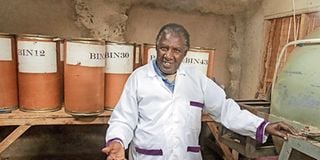Septuagenarian’s formula to earn more from purple tea

Robert Murimi explains the manufacturing process of specialty tea at this establishment in Nyeri County. His farm has so far enrolled 86 purple tea farmers from Ragati catchment area in Mathira as well as Kirinyaga County for which he will be processing the tea. PHOTO | JOSEPH KANYI | NATION MEDIA GROUP
What you need to know:
- Robert Murimi is among those who heeded to the call seven years ago by embracing the variety.
- His farm has so far enrolled 86 purple tea farmers from Ragati catchment area in Mathira as well as Kirinyaga County for which he will be processing the tea.
- Murimi has been selling his produce to Ragati Tea factory, fetching at least Sh16 per kilo, which is the same price for which green leaf tea goes.
- For Tea Directorate to license a cottage industry, one has to own 54 acres of land under purple tea. Murimi has achieved this by working with the 86 farmers.
Sometime back, the Kenya Tea Development Agency (KTDA) urged farmers to diversify the growing of the crop by embracing other varieties, in particular purple tea,
Robert Murimi is among those who heeded to the call seven years ago by embracing the variety.
Murimi cleared some 20,000 bushes of green tea on his four-acre farm in Ndumanu, Mathira constituency, to make way for the new variety.
Then, some people thought that he had lost it, but he is today a licensed purple tea producer in Nyeri County and he is set to start processing, packaging and exporting the produce under his company Horera Forest Edge Tea Company.
His farm has so far enrolled 86 purple tea farmers from Ragati catchment area in Mathira as well as Kirinyaga County for which he will be processing the tea.
"I received the machine from the Purple Tea Association of which I am a member and I have all the licences to process. This will earn me more income."
Murimi has been selling his produce to Ragati Tea factory, fetching at least Sh16 per kilo, which is the same price for which green leaf tea goes.
In the international market, purple tea fetches up to Sh2,000 per kilo as compared to Sh280 per kilo for green tea.
“I planted the tea because it fetches a little higher prices than the traditional varieties but the local market has been fickle, worsened by the Covid-19 pandemic. I am now banking on processing,” he says.
ORTHODOX TEA FARMING
For Tea Directorate to license a cottage industry, one has to own 54 acres of land under purple tea. Murimi has achieved this by working with the 86 farmers.
The directorate has licensed him to process up to a million kilos of purple tea and with the farmers already owning 75,000 bushes, he hopes for a change of fortunes.
“Currently, I am processing 30-40 kilos of purple tea per hour but I hope to increase my capacity,” says the 76-year-old, noting that he is awaiting certification from Kenya Bureau of Standards.
One of his challenges is getting financial aid from lenders and increasing subdivision of land.
According to Boaz Kiter, the chairman Purple and Specialty Tea Association of Kenya, constrain in registration and licensing of cottage industries has hindered farmers from embracing orthodox tea farming.
He said his company, Tumoi Tea Company in Nandi, in partnership with Horera are jointly marketing their produce to international buyers in North America and Australia.
“Unlike the price hype we hear every day, purple tea is yet to pick up and its farming is yet to become profitable because of lack of reliable market.”
He said the association will help Murimi sell his produce both locally and internationally.
“The deep colour in the purple tea grown in the highlands is one of the traits that make the overseas market desire it, pushing up demand,” says Kiter.





